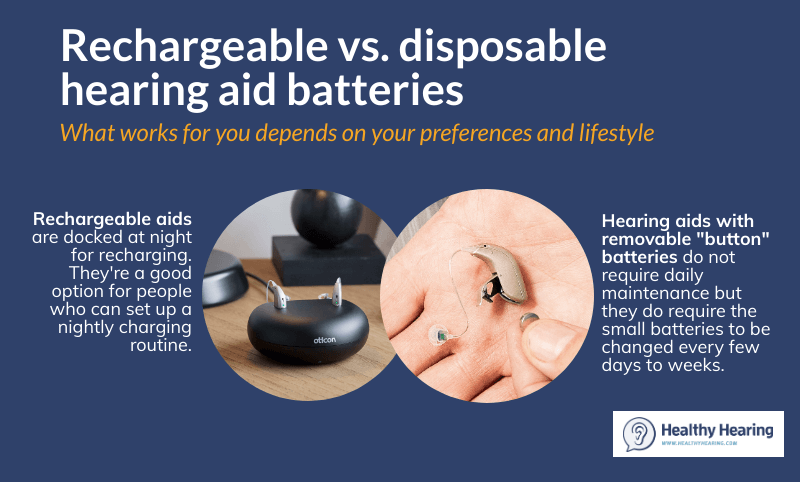|
www.HealthyHearing.com |
Pros and cons of hearing aids with rechargeable batteriesHearing aids with rechargeable batteries are quickly becoming the more popular option
Contributed by Debbie Clason, staff writer, Healthy Hearing Hearing aids these days are powered by either one of two types of batteries: Disposable, removable "button" batteries or rechargeable batteries that cannot be removed.
As the technology improves, hearing aids with rechargeable batteries are quickly becoming the more popular option for many people. However, some people may prefer hearing aids with disposable batteries, depending on their circumstances.
What is a rechargeable hearing aid battery?Rechargeable hearing aids have built-in batteries that do not require regular removal, unlike hearing aids with traditional disposable batteries. Instead of removing the batteries themselves, you dock your hearing aids each night on a charging unit, similar to how smartphones recharge. Most rechargeable hearing aids are best-suited for people with degrees of hearing loss ranging from mild to moderate. However, rechargeable "power" hearing aids for people with severe to profound hearing loss are available from some brands. Should I get a hearing aid with rechargeable batteries?If you're ready for rechargeable hearing aid batteries, switching is more complicated than simply going to the drugstore and purchasing rechargeable button batteries in the correct size. These don't exist. Instead, the best thing you can do is talk to your hearing healthcare professional about purchasing new hearing aids that are already equipped with rechargeable batteries. 
specialist Tim Cross So how do you decide if rechargeable hearing aids are right for you? It's a personal decision based on preferences and finances. Knowing the advantages and disadvantages of hearing aids with rechargeable hearing aids can go a long way to helping you and your hearing care practitioner pick the best style for you. Advantages of using rechargeable batteries
“If peeling the tab off a battery and not dropping it, or being able to get it to fit into the compartment, is difficult for somebody, then rechargeable would be a huge advantage,” said Tim Cross, a hearing instrument specialist and owner of Earzlink Hearing Care in Hillsboro, Ohio. For example, a 90-year-old patient of Cross's found them to be invaluable. “Quite frankly, you could drive down the street and hear her television or pound on the door and she would not hear you,” he said. “She had limited dexterity and sight — and wouldn’t wear hearing aids because she couldn’t change the battery.” He fit her with rechargeable hearing aids and kept an extra charger in his office so she wouldn’t have to live without her hearing aids if a problem occurred. “It totally changed her life,” he said, “and gave her family peace of mind.” Disadvantages of rechargeable batteriesBut not everyone is well suited to wear rechargeable hearing technology. “For the most part, it’s very simple and basic,” Cross said, “but some people might not think beyond the normal routine and process (such as power outages or if the grandkids accidentally unplug the charging unit). Someone with a highly active lifestyle may need immediate access and not have time to recharge,” he added. “In these situations, it’s much easier to just pop in a new set of batteries.” Other disadvantages include:
Rechargeable hearing aids increasing in popularityCross predicts rechargeable hearing aid instruments will become even more commonplace as sound quality, battery efficiency and interchangeability, and cosmetic appeal continue to improve. “Over 35 years I’ve seen rechargeability come out as a means of drawing people into the hearing aid marketplace,” he said. “It resurfaces every seven years or so as something fresh and new and then it goes away. This last wave has become more of a mainstay. The current generation of technology has come close to meeting consumer requests, that’s why I think it’s going to become normalized moving forward.” His patients who wear rechargeable hearing aids “like them and are comfortable with them. They got them for a reason,” Cross said. “They were appropriate for them and met the needs that they have.” Interested in learning more?Of course, there are plenty of other factors to consider when buying a hearing aid, so it's important to talk in depth with your hearing care professional about the best hearing aid for you—which may or may not come with rechargeable batteries. Visit Healthy Hearing’s online directory of hearing clinics to find a trusted provider near you. Debbie Clason, staff writer, Healthy Hearing
Related Help Pages:
Hearing aids Technology Reviews and comparisons Cleaning Batteries Accessories Used hearing aids
|
Featured clinics near me
Earzlink Hearing Care - Reynoldsburg
7668 Slate Ridge Blvd
Reynoldsburg, OH 43068

Find a clinic
Need a hearing test but not sure which clinic to choose?
Call 1-877-872-7165 for help setting up a hearing test appointment.



 Debbie Clason holds a master's degree from Indiana University. Her impressive client list includes financial institutions, real estate developers, physicians, pharmacists and nonprofit organizations.
Debbie Clason holds a master's degree from Indiana University. Her impressive client list includes financial institutions, real estate developers, physicians, pharmacists and nonprofit organizations.